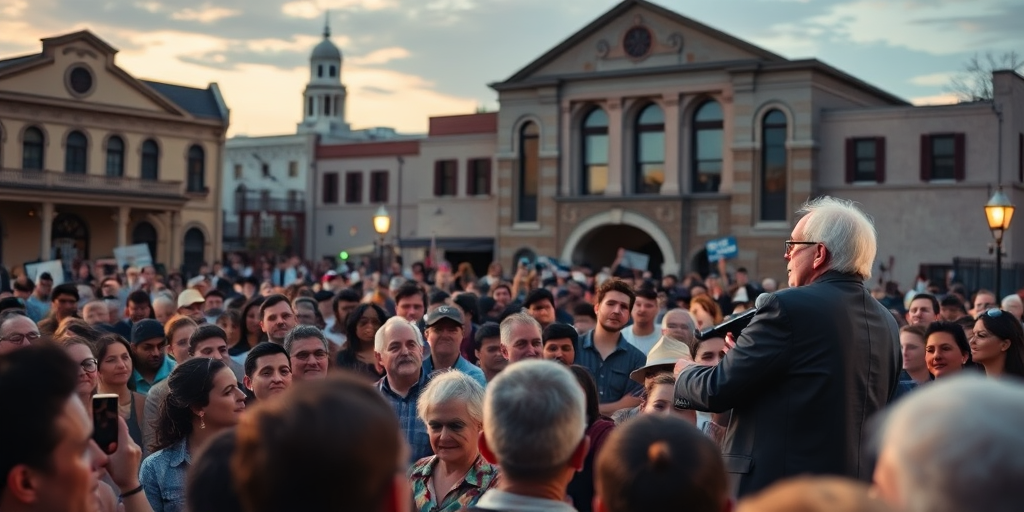Sen. Bernie Sanders Rallies in McAllen for New Generation of Progressives
In a dynamic display of political fervor, Senator Bernie Sanders captivated a packed crowd at the McAllen Performing Arts Center as part of his nationwide “Fight Oligarchy” tour. Sanders’ visit, which took place on June 20, 2025, marked a strategic effort to rally support in Republican-held congressional districts and inspire a new wave of progressive candidates within South Texas and beyond.
A Call for Economic Justice
Before an audience consisting of dedicated progressives, intrigued moderates, and curious onlookers, Sanders passionately decried the current economic policies championed by opposing political leaders. With a focus on restructuring tax codes to ensure equitable contributions from the wealthy, Sanders stated, “Instead of giving tax breaks to billionaires, which is what Trump wants, our demand is that when the rich have never had it so good they’re going to start to pay their fair share of taxes.”
Another key theme of his speech was the potentially adverse outcomes of proposed Medicaid cuts, forecasted to undermine the sustainability of community health centers and increase strain on healthcare services crucial to underprivileged Valley residents. Sanders emphasized, “This policy would provide more than $400 billion to large corporations who will use those tax breaks to bring in robotics and artificial intelligence, potentially throwing many hardworking American workers out on the street.”
Local Responses to National Agendas
The visit from the Vermont Senator prompted swift reactions from both supporters and critics within the Rio Grande Valley (RGV). Gabriela Zavaleta, a Brownsville resident, expressed her belief in the Democratic Party’s need to redefine the immigration narrative, which she considered key to bridging divides within the Valley. “I think [they] need to admit that immigration is broken, and that it needs to be fixed with an easier way for undocumented people to become legal,” she conveyed.
Meanwhile, Robert Cantu, GOP Chair of Hidalgo County, contested the relevance of Sanders’ message, asserting, “Bernie Sanders and the Democrats understand South Texas is turning red and are afraid of losing more races down here in the midterm elections. The problem is their message is not resonating with the voters here in South Texas.”
Political Alliances and Opposition
Joining Sanders was Congressman Greg Casar of San Antonio, who aligned with Sanders’ agenda by speaking against the Texas school choice voucher bill and recent heightened immigration enforcement activities. Their collective condemnation of governmental policies highlighted the evolving political battleground in South Texas, where viewpoints on education, healthcare, and immigration heavily influence local dynamics.
Several Valley residents resonate with Sanders’ propositions, considering his initiatives as addressing critical needs within the community. However, the potential impacts of proposed federal tax reforms and state policies continue to elicit diverse interpretations among Valley voters, reflecting the area’s complex socio-economic mix.
Pivotal Implications for the Rio Grande Valley
The local impact of Sanders’ rally is manifold. His emphasis on Medicaid cutbacks holds particular significance for RGV’s healthcare facilities often servicing low-income populations. Potential funding reductions may compromise essential operations, emphasizing the importance of achieving targeted solutions.
Furthermore, by espousing policies encouraging political activism, Sanders inspires a generation eager to tackle oligarchic influences within government structures, potentially fostering increased political participation across South Texas. This political awakening serves a dual purpose: invigorating the local Democratic base while challenging monotone narratives.
As Sanders’ tour wends through key states like Louisiana, its reach into the heart of communities such as McAllen mirrors a broader national struggle to assert progressive principles amid staunch opposition.
Fostering Dialogue and Engagement
In the context of Sanders’ arguments and the varied reactions it sparked, engaging RGV residents in continued dialogue is imperative. Residents are encouraged to utilize forums, local political assemblies, and communal gatherings, ensuring a bipartisan effort toward improving lives in the Valley. For those seeking further information on the implications of national policy shifts, including healthcare reforms, direct consultations with local representatives are advised.
In conclusion, Sanders’ rally in McAllen underscores an ongoing flux within South Texas political landscapes. The enthusiastic responses and pointed criticisms frame an evolving narrative grounded in advocacy and democratic participation for Valley residents, marking a crucial chapter in the region’s pursuit of social and economic justice amid broader national discourses.







